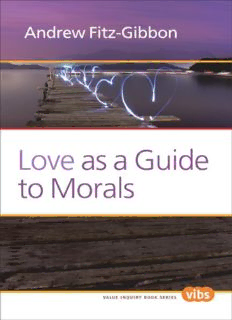
Love as a Guide to Morals PDF
Preview Love as a Guide to Morals
LOVE AS A GUIDE TO MORALS VIBS Volume 249 Robert Ginsberg Founding Editor Leonidas Donskis Executive Editor Associate Editors G. John M. Abbarno Steven V. Hicks George Allan Richard T. Hull Gerhold K. Becker Michael Krausz Raymond Angelo Belliotti Olli Loukola Kenneth A. Bryson Mark Letteri C. Stephen Byrum Vincent L. Luizzi Robert A. Delfino Hugh P. McDonald Rem B. Edwards Adrianne McEvoy Malcolm D. Evans J.D. Mininger Roland Faber Peter A. Redpath Andrew Fitz-Gibbon Arleen L. F. Salles Francesc Forn i Argimon John R. Shook Daniel B. Gallagher Eddy Souffrant William C. Gay Tuija Takala Dane R. Gordon Emil Višňovský J. Everet Green Anne Waters Heta Aleksandra Gylling James R. Watson Matti Häyry John R. Welch Brian G. Henning Thomas Woods a volume in Ethical Theory and Practice ETP Olli Loukola, Editor LOVE AS A GUIDE TO MORALS Andrew Fitz-Gibbon With a Guest Foreword by Barry L. Gan Amsterdam - New York, NY 2012 Cover photo: www.dreamstime.com Cover Design: Studio Pollmann The paper on which this book is printed meets the requirements of “ISO 9706:1994, Information and documentation - Paper for documents - Requirements for permanence”. ISBN: 978-90-420-3530-0 E-Book ISBN: 978-94-012-0805-5 © Editions Rodopi B.V., Amsterdam - New York, NY 2012 Printed in the Netherlands Ethical Theory and Practice (ETP) Olli Loukola Editor Other Titles in ETP Michael H. Mitias. Friendship: A Central Moral Value. 2012. VIBS 239 True love in every moment praises God. Longing love brings a sorrow sweet to the pure. Seeking love belongs to itself alone. Understanding love gives itself equally to all. Enlightened love is mingled with the sadness of the world. But selfless love bears an effortless fruit, working so quietly even the body cannot say how it comes and goes. Mechtild of Magdeburg Love’s hidden life is in the innermost being, unfathomable, and then in turn is in an unfathomable connectedness with all existence. Søren Kierkegaard For Larry Ashley, Mentor, Good Friend, Squash Player, and Philosopher’s Philosopher CONTENTS Editorial Foreword xiii OLLI LOUKOLA Guest Foreword xv BARRY L. GAN Preface xix A CT I Love and Morality 1 A CT II Love’s Complexity 13 ACT III Love’s Appearance: Eros 31 A CT IV Love’s Appearance: Friendship, Affection, and Agape 53 ACT V Love-Itself 69 ACT VI Love’s Practice 91 ACT VI I Epilogue 109 Endnotes 111 Bibliography 127 About Author 133 Index 135 EDITORIAL FOREWORD Ethical questions are the primary questions of human existence. No matter what else we do in our lives, sooner or later, ethical issues arise seriously af- fecting our relationships, choices, and actions. At the same time, the language of ethics contains an illusion of straightforwardness and immediate under- standing. Just as is the case with ordinary language, most of us are fully com- petent to use it, capable of expressing ourselves through it, and getting things done with it, sometimes debating, other time agreeing. Ethics are integral to who we are. The paradigmatic mode for ethical language and discussion was set by Socrates with his dialectical method some two and a half thousand years ago. The Socratic dialogues contain the same deceptive illusion of easiness, straightforwardness, and simplicity. They are comfortably readable and un- derstandable with no prior philosophical expertise, and surely—as historians have shown—Plato wrote them with this goal in mind. Yet this apparent sim- plicity never diminished their value as philosophical texts in any manner, and as we all know, the dialogues were, in fact, the starting point of the philo- sophical enquiry of morality of our civilization. This appearance of straightforwardness of ethical issues sometimes cloaks the fact that answers to ethical dilemmas are hardly ever easy to find. Moreover, it gives layperson no indication of the fact that philosophical ethi- cal inquiry is a highly specialized, technical, and abstract skill, a techné. Thus, the illusion of easiness of ethical discussion is deceptive indeed. Ethical enquiry begins from the various human projections, reflections, and view- points concerning ethical life. In this examination, it utilizes a variety of tech- niques, empirical and theoretical data, conceptual analysis and argumentation, and a range of methods and frames of reference. It is just this sort of ethical inquiry is the explicit goal of this special series, Ethical Theory and Practice (ETP), where this book is now published; that is, to describe, examine, and analyze ethical issues through the understanding afforded to us by the various academic disciplines. It is an enormously rich field of inquiry, bordering at the far extremes of theory and practice. The volume at hand, Love as a Guide to Morals, represents the goal of ETP par excellence. At face value, it is highly readable, enticing, and fasci- nating, following the best traditions of philosophical writing; yet at the same time, it contains careful argumentation, detailed analysis, and enlightening insights in the very same vein as the best of ethical inquiries. Text such as this one would simply not be possible without thorough familiarity of ethical is- sues, their philosophical underpinnings, and the methods used in their study. Thus, the illusion of easiness of ethical discussion still prevails, but here, as in best philosophical dialogues, the discussion is interwoven within the rich and multifaceted fabric of our history, philosophy, and civilization. The easiness
Description: